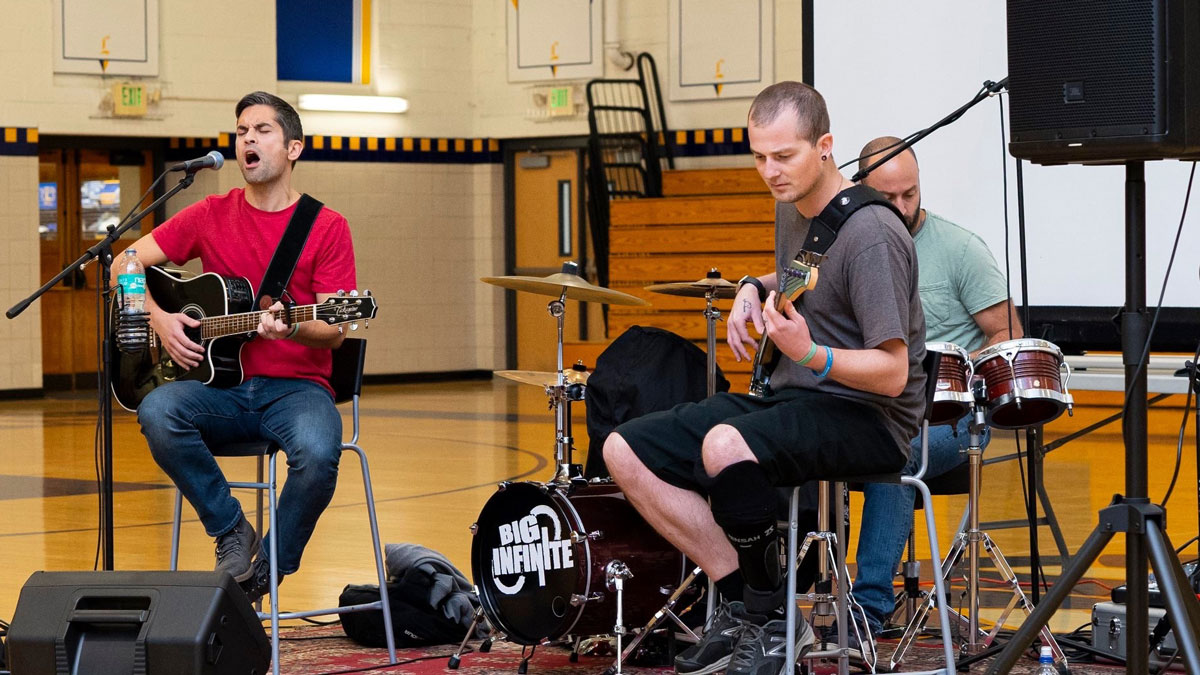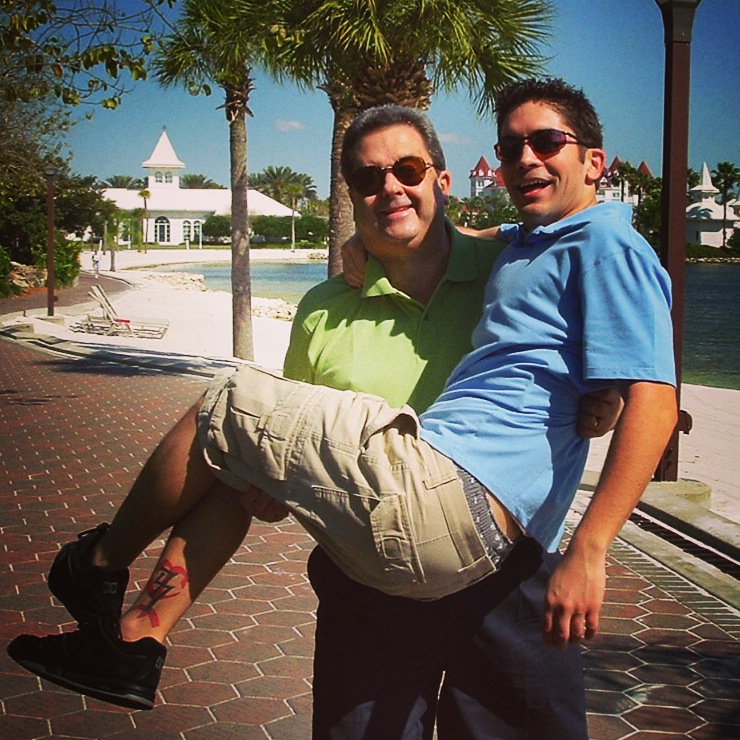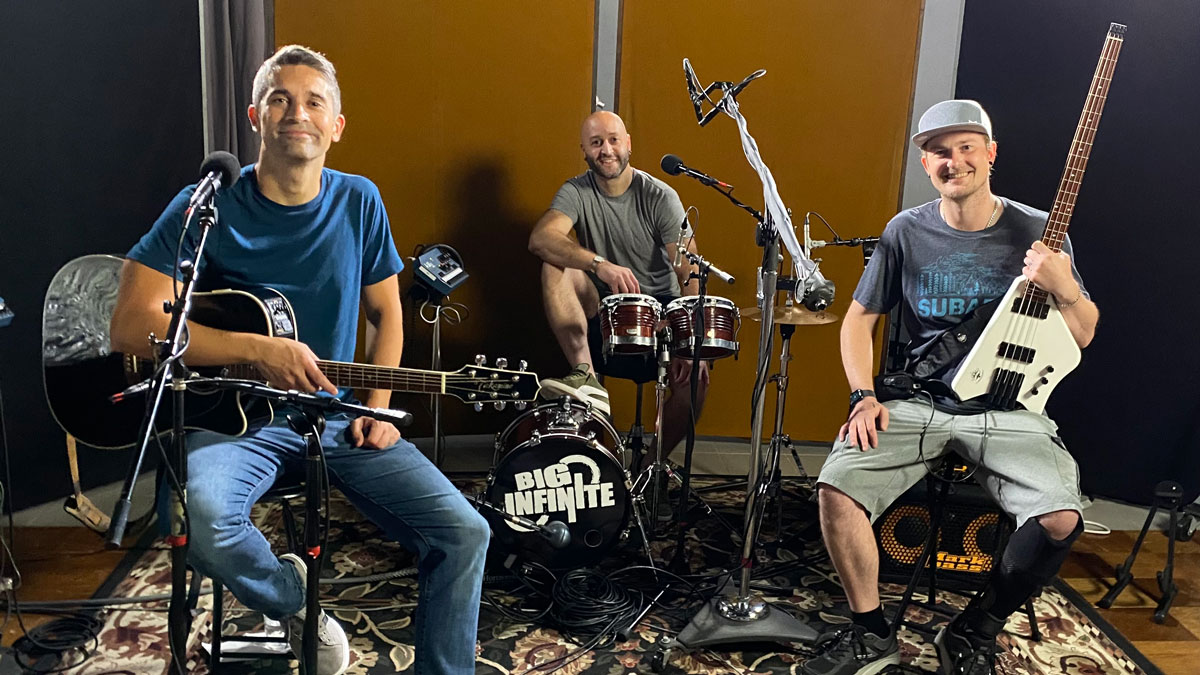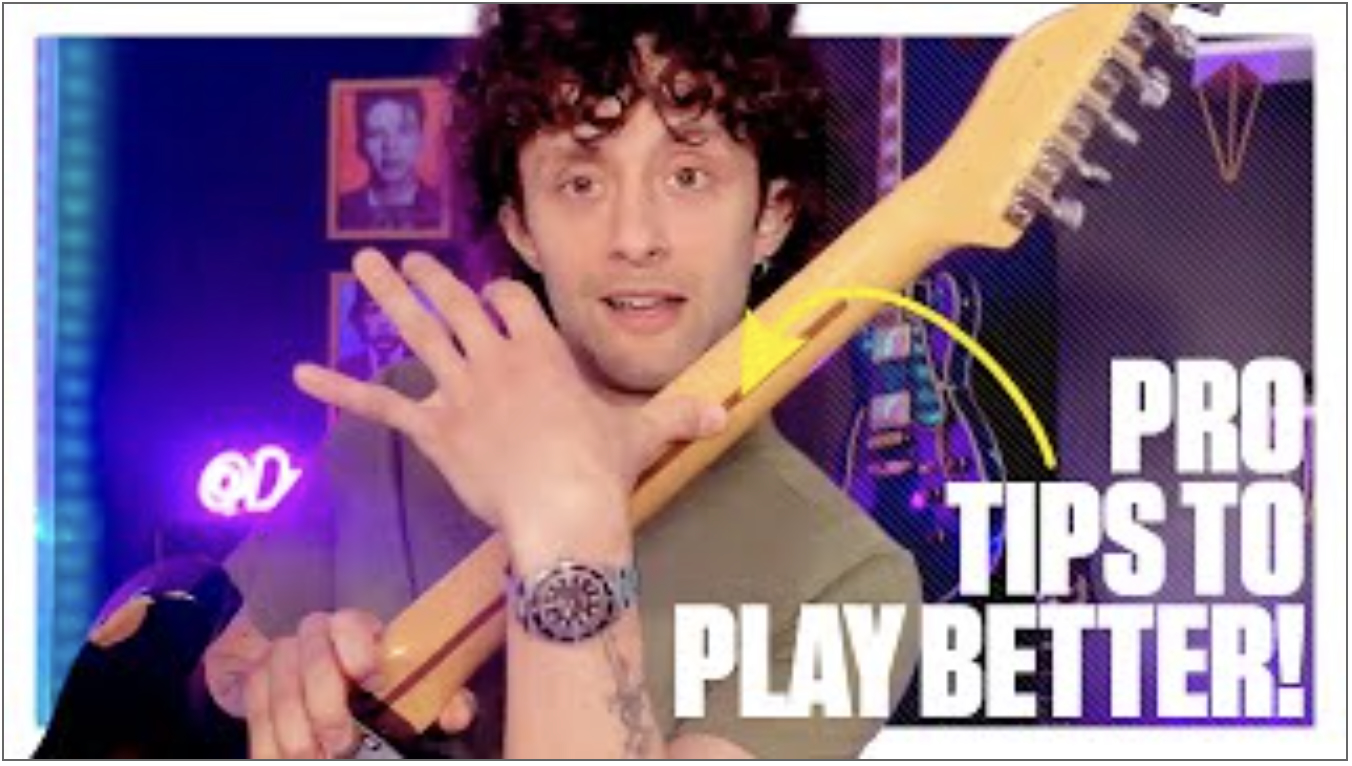How a Maryland rock band is challenging the stigma around mental health and suicide, one high school at a time
Big Infinite's Jordan Lally on his personal journey with depression and transforming his musical output into a vehicle for education

Starting with Mental Health Awareness month and continuing throughout the following months, Guitar World is hosting a series of interviews and features with artists addressing and raising awareness around themes of mental health, particularly as they relate to musicians.
In 2014, Maryland-based Fiction 20 Down were in Florida, enjoying another string of successful tour dates. Singer/songwriter/guitarist Jordan Lally, multi-instrumentalist DJ Fritzges, and drummer/vocalist Andre “Dre” Toney had spent years writing, recording, gigging, winning awards, and building their loyal fan base.
Until Jordan Lally received the call: his beloved father, Ed, was gone, following a long battle with depression.
With the band on hold, Jordan Lally began doing the extremely difficult work of bereavement recovery and emerged with a goal: music as a vehicle for mental health awareness. The trio reunited as Big Infinite – a new name with a new mission.
To honor Ed Lally’s memory, Jordan, his wife Megan, his mother Sharon, and his sisters, Alexis and Candace, launched the Ed Lally Foundation. Its focus is to provide mental health education and support. Among its many outreach programs, Jordan and Candace host a weekly podcast, Truth & Levity, and he and his mother lead a bereavement support group.
Jordan teaches meditation as a mental health practice through the Foundation as well. Big Infinite perform and speak at high schools through their Power Of Expression mental health and suicide prevention assembly program, lead workshops, and will release a mental health documentary, Power Of Expression, next year.
Jordan Lally spoke candidly and at length with GuitarWorld.com. His interview has been edited for space. [Note: Suicide is discussed in this conversation.]
Get The Pick Newsletter
All the latest guitar news, interviews, lessons, reviews, deals and more, direct to your inbox!
Prior to losing your father, what was your understanding of mental health?
“I had a wealth of personal experience, but very little understanding. I had dealt with social anxiety since before high school – so much so that I didn't sing out loud until I was 27 years old.
“The first few years of touring, up until I lost my dad, the only way I could get onstage was to have a few drinks. I'd be anxious leading up to the show, drink my way through it, get off stage, and feel depressed for having been so anxious. That cycle played out over and over again. But I had no real understanding of what was happening, because, as best I could, I ignored what I was feeling, ignored the thoughts that were moving through my headspace, ignored the anxiety.
“I also have a personal understanding of depression. The worst bouts were back in college, before I started my music career. I couldn't get it together in any way, shape, or form. There were periods when I couldn’t get out of bed for weeks on end. I’d beat my chest until it bruised and put cigarettes out on my leg to distract myself from those feelings. But again it was, 'I don't want to take a look at that; I’m just going ignore it and power through.'
“I graduated college, and my 25th birthday was the first time I became acutely aware of my own mental health struggles in any real way, because that was my dad's first attempt at suicide. The reality hit me in a way that I can't give words to. The police called us – Dad was in the hospital, and thankfully he was alive. He assured us that he was okay, it was a combination of medications the doctor had prescribed, he'd be fine, and let's not talk about it again.
“At the time, I was more than willing to help him sweep it under the rug, because his struggle was highlighting my own struggles and I didn't want to face them. It wasn't until I lost him that I started to truly understand the weight of those mental health struggles for him and for myself.”

The band bio says that you took “a self-imposed hiatus from music.” What did you do to heal during that time?
“It started with my dad's eulogy. I was honest through and through about his suicide and battle with depression. After the service, people offered their condolences, a lot of them thanked me for being so honest, and many of them told me very personal stories of their own struggles and of people they’d lost to suicide.
“It was transformative for me to realize, just by giving that eulogy and opening the door to talk about it, how many people walked through it immediately and wanted to share. Those conversations were the first time I ever told anybody, except for my wife, about my own struggles.
Truth and meditation shepherded me through the grief and helped me learn to better cope with, navigate, and to even heal from my own experiences of depression and anxiety
“During that last year of my dad's life, I took him to a lot of his doctor's appointments, and my wife, mom, and I helped him run his business. I had a front-row seat to what depression could do to a brain. My dad was always a happy guy. He was my best friend, the best man at my wedding, and the biggest supporter of Fiction 20 Down. But when he experienced depression, he was the polar opposite of all those things.
“When it led to his first attempt, I wasn't living at home, and my parents thought it best to shield me from it. But during that last year, I spent a lot of time with him, and I saw the anxiety and depression so clearly. He wore it on his face, and it was such a stark contrast to who he was when mentally healthy.
“Through the experience, I started to truly recognize the depression and anxiety within myself, and when he passed, it was the wake-up call that I needed. My approach to healing began with the honesty of that eulogy, and continued the day after his funeral, when I began meditating twice a day for 15 to 20 minutes. I had no clue how to meditate, but I held the unavoidable lesson of my father’s passing close to my heart, and kept at it. And I continued being open and honest, which was a far cry from how I approached life before then.
“Both of those practices – truth and meditation – shepherded me through the grief and helped me learn to better cope with, navigate, and to even heal from my own experiences of depression and anxiety.”
Would you agree that grief is a mental health struggle?
“Absolutely. My experience with grief was very similar to my experiences of depression. The turning point for both was my sincere desire to feel for the first time in my life. In the months after my dad passed, I’d read through years of text messages from him, just because I wanted to feel through that grief. I wanted to feel that sadness. I want to feel, and to heal.
“My dad never leaned into uncomfortable emotions, like sadness or anger, and I followed suit right up until I lost him. I finally became willing to feel those emotions, to cry, to sit in meditation with tears pouring down my face, and to talk openly about it all.”
When the band reunited as Big Infinite, you changed your direction and sound. How much of that was time passing and how much was what you’d gone through?
“It was both. There was no predetermined plan to become champions for mental health. We took some time off. I started to acknowledge my feelings, my depression, my anxiety, and through that process, I became a different songwriter. I had a lot of emotions I had kept inside for virtually two decades. There was some anger I needed to work through, some heaviness and sadness.
“Songwriting was the one place where I was the most honest in my life, but this was a whole different level of vulnerability and honesty. It became obvious that this was a new chapter, so we changed the band name. The journey to use our music as a message for mental health unfolded organically, one opportunity at a time.”
Has songwriting always been therapeutic for you?
My songs always carried a level of honesty that I wasn't necessarily capable of on the surface
“Completely, and long before I recognized it as such. My songs always carried a level of honesty that I wasn't necessarily capable of on the surface. When I’d listen back to them – the next day, the next week, or even the next year – I recognized how insightful they were and how much I stood to learn from them. They were giving voice to my subconscious. Songwriting was a form of self-expression that existed in my life years before I was willing to express myself openly in conversation. It was a form of therapy, for sure.”
What role did your bandmates play in your healing process?
“When I’m doing a speaking engagement, the one topic that usually brings tears to my eyes is those gentlemen. When I got the call that my dad had passed away, I basically collapsed, and those guys caught me, ushered me into our tour van, and drove me through the night from Florida back to northern Maryland. I cried, sobbed, and wailed for 15 hours straight and they were there for me. They weren’t trying to fix me, they weren't judging me, they were just rock-solid there for me. That hasn't changed, even as the trajectory of the band has changed. Instead of playing outdoor festivals in California, we're playing high schools in Maryland at 8 am and they're right there – supportive and engaged.
“My dad was close with all of us. He was our number one supporter, and we practiced in my parents’ home every week for almost a decade. When he passed, the three of us became open and honest about our own personal experiences with anxiety and depression. We went from being coworkers to being a family. I love those dudes with all my heart. They've been there for me in every way possible, and we've grown together through this journey.”
What is on the musical horizon for Big Infinite?
“So far we’ve released a few singles and The Big Infinite Volume 1 EP, but this band is a departure from Fiction 20 Down. That band was always onto the next thing. In the time we were together as Fiction 20 Down, we put out four full-length albums, two EPs, a mixtape, and a live album.
“With Big Infinite, our focus is on being present with the music, with one another, and doing the mental health work. The music is obviously very important, but we're not pushing the way we used to. We have probably 25 songs written for Volume 2, but we're waiting for the right producer and the right timing. We have a few things we'll be releasing in the meantime that are more live-oriented.
“We do some presentations and concerts that are more music and meditation. It's not what you would think of when you think of 'meditation music.' It's lyrics and rock songs, but with a meditation experience. Before the end of the year, we'll release a few songs that are extended meditative versions of our material. Hopefully the stars will align and we’ll release Big Infinite Volume 2 next year. Our documentary with producer/director Greg Dicharry, The Power of Expression, is now scheduled for release in May 2022, for Mental Health Awareness Month.”
Tell us about the Ed Lally Foundation.
“After my dad passed, a lot of the meetings or groups I would sit in on, in service of suicide prevention, were always talking about reactive methods – how do we respond in a crisis, how do we improve response time of our suicide prevention hotlines, those kinds of things.
“They are all necessary and extremely important, but no-one was talking about long-term preventative measures, no-one was talking about improving people’s ability to cope and to heal. And so that's our goal and focus: advocating and educating people about a proactive approach to mental health.”
You are taking Power Of Expression to high schools. Anxiety and depression are skyrocketing among that demographic. What are you finding at the assemblies?
“Our experiences have been eye-opening. We have been so moved by how students receive our mindful mental health message. I share my personal story, my father’s story, the journey with my bandmates, and we intersperse it with songs to keep the students engaged and reach folks on a different level.
“Two-thirds of the way through, we do a meditation. At the first couple of schools, I didn't know how that was going to go. I envisioned kids talking or yelling in the middle of it, but in every school we've been to thus far, you can hear a pin drop. After the assembly there's always a line of students, many in tears, thanking us for being so honest. To call these assemblies the most moving experience we've ever had through our music career would be a gross understatement.
“Midway through the assemblies, we distribute an anonymous survey with ten questions about anxiety and depression. The students fill them out, they’re collected, shuffled, and handed back out. Every student is holding a different student’s answers.
“DJ, Dre, and our assembly co-producer, Tara DeCapite, lead them through an exercise where, let's say the first question asks if you have experienced anxiety. If your paper says, 'Yes,' please stand. Every time, something like 70 or 80 percent of the students stand up. You can hear audible gasps when they look around and see most of their peers standing. And without fail, at least one staff member, usually more, breaks down into tears because they had no idea how pervasive students’ inner struggles are. We can see and feel the message being received: you are not alone.”

People too often say – whether flippantly to each other, or callously to the depressed – “Go kill yourself.” What do you wish they understood about those words?
“That happened a few months after my dad passed. We were in a restaurant, and in the booth behind me people were joking – 'Oh, just go kill yourself.' I heard those words, and everything came flooding back in that moment. But instead of trying to fix the outside world, I decided to use it as an opportunity to heal myself. Instead of pointing a finger, getting angry, and blaming people, I recognize that it’s something unresolved within me. I focus on my breath and take my meditation practice into the moment. I feel and I heal. That’s my answer personally.
The brain is an organ just like the heart. They’re no different. Both organs have the capacity for wellness and for disease
“Professionally, I try to educate people the best I can. Whenever I speak of my dad’s passing, I say he died by depression – depression that culminated in suicide. If someone uses the word 'committed,' I politely let them know that the implication might not be received in the best light by some folks. Those of us who have lived through the experience, the more we speak openly and honestly, and personalize what those words might mean – I’ve found most people are pretty compassionate when they understand the impact.
“It’s an overarching message for me, and I hope my honesty and vulnerability can inspire a different level of understanding and compassion in others I connect with. That stuff comes up so very often. I never noticed it before, but I became acutely aware once I lost my dad.
“In general, I try to educate people that the brain is an organ just like the heart. They’re no different. Both organs have the capacity for wellness and for disease. There’s a stigma and misunderstanding that somehow suicide by default is a conscious choice, when in fact it is most often the result of a diseased organ and a lack of mental health. That’s what I want to share with folks.”
- For more information, visit the Ed Lally Foundation and BigInfinite.com.
Further mental health resources
Alison Richter is a seasoned journalist who interviews musicians, producers, engineers, and other industry professionals, and covers mental health issues for GuitarWorld.com. Writing credits include a wide range of publications, including GuitarWorld.com, MusicRadar.com, Bass Player, TNAG Connoisseur, Reverb, Music Industry News, Acoustic, Drummer, Guitar.com, Gearphoria, She Shreds, Guitar Girl, and Collectible Guitar.
“I knew the spirit of the Alice Cooper group was back – what we were making was very much an album that could’ve been in the '70s”: Original Alice Cooper lineup reunites after more than 50 years – and announces brand-new album
“Such a rare piece”: Dave Navarro has chosen the guitar he’s using to record his first post-Jane’s Addiction material – and it’s a historic build




![[from left] George Harrison with his Gretsch Country Gentleman, Norman Harris of Norman's Rare Guitars holds a gold-top Les Paul, John Fogerty with his legendary 1969 Rickenbacker](https://cdn.mos.cms.futurecdn.net/TuH3nuhn9etqjdn5sy4ntW.jpg)





